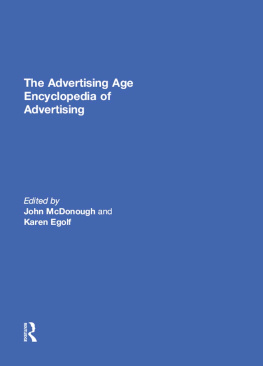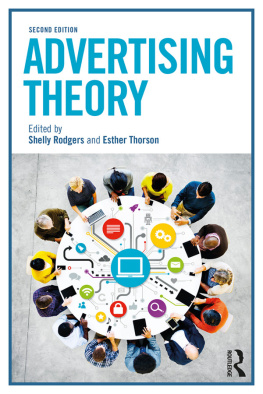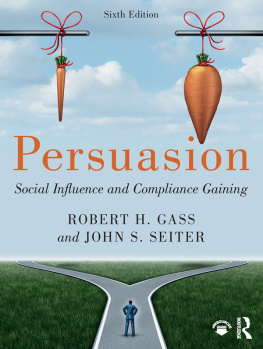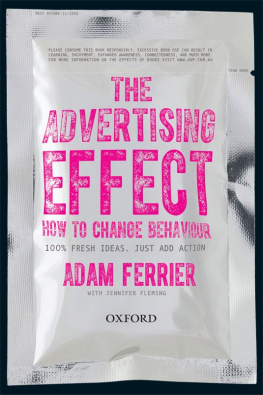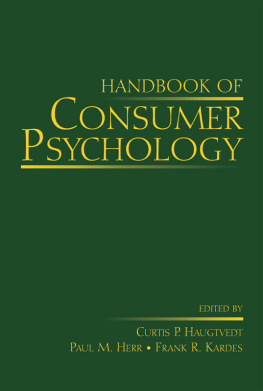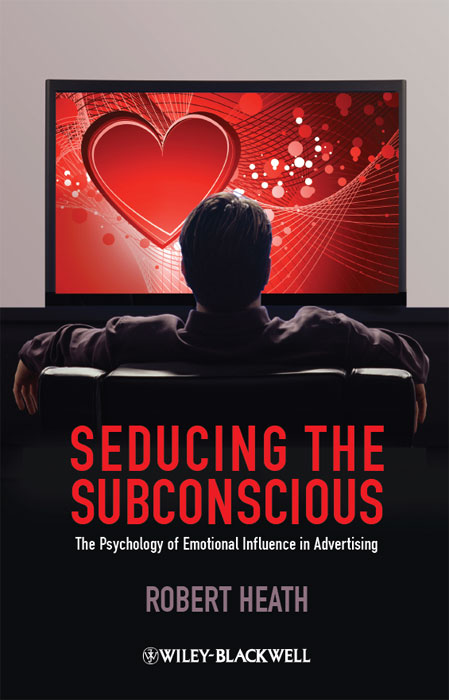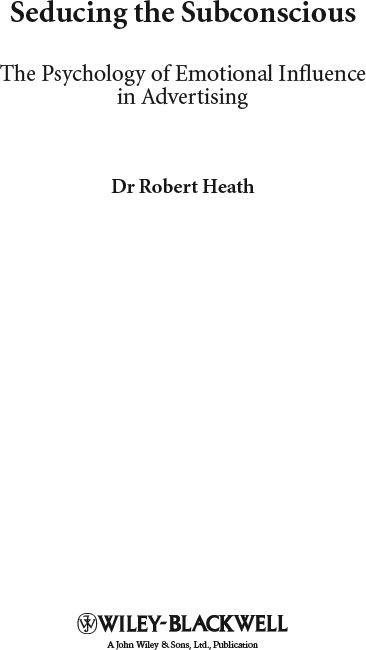Robert Heath - Seducing the Subconscious: The Psychology of Emotional Influence in Advertising
Here you can read online Robert Heath - Seducing the Subconscious: The Psychology of Emotional Influence in Advertising full text of the book (entire story) in english for free. Download pdf and epub, get meaning, cover and reviews about this ebook. City: Chichester, year: 2015, publisher: Wiley-Blackwell, genre: Politics. Description of the work, (preface) as well as reviews are available. Best literature library LitArk.com created for fans of good reading and offers a wide selection of genres:
Romance novel
Science fiction
Adventure
Detective
Science
History
Home and family
Prose
Art
Politics
Computer
Non-fiction
Religion
Business
Children
Humor
Choose a favorite category and find really read worthwhile books. Enjoy immersion in the world of imagination, feel the emotions of the characters or learn something new for yourself, make an fascinating discovery.

- Book:Seducing the Subconscious: The Psychology of Emotional Influence in Advertising
- Author:
- Publisher:Wiley-Blackwell
- Genre:
- Year:2015
- City:Chichester
- Rating:5 / 5
- Favourites:Add to favourites
- Your mark:
Seducing the Subconscious: The Psychology of Emotional Influence in Advertising: summary, description and annotation
We offer to read an annotation, description, summary or preface (depends on what the author of the book "Seducing the Subconscious: The Psychology of Emotional Influence in Advertising" wrote himself). If you haven't found the necessary information about the book — write in the comments, we will try to find it.
Our relationship with ads: its complicated
A must-read for anyone intrigued by the role and influence of the ad world, Seducing the Subconscious explores the complexities of our relationship to advertising. Robert Heath uses approaches from experimental psychology and cognitive neuroscience to outline his theory of the subconscious influence of advertising in its audiences lives. In addition to looking at ads influence on consumers, Heath also addresses how advertising is evolving, noting especially the ethical implications of its development. Supported by current research, Seducing the Subconscious shows us just how strange and complicated our relationship is with the ads we see every day.
ReviewSumming Up: Recommended. Upper-division and graduate students of advertising and psychology, faculty, and practitioners. (Choice, 1 October 2012)
Heaths book is far more persuasive than any advertisement, no matter how top-loaded the latter may be with accurate information. His thesis depends on a lengthy journey through cognitive science and evolutionary psychology, and a firm grasp on how so far as we know the human mind actually does work (rather than how we would like it to work). Heath demonstrates quite clearly at least to my satisfaction that it is precisely when we pay no conscious attention to advertising that advertisers get to work on our subconscious with complete effectiveness. WILL SELF, Prospect, June 2012
(Heath) avoids academic obscurantism and fills the book with clever dissections of well-known ads... The case studies add up to an intriguing, down-to-earth introduction to the mysteries of the subconscious...
Financial Times, March 2012
Dr Robert Heath, who teaches at the University of Bath, has popularised the theory of low attention processing, which argues that ads make a stronger emotional and behavioural impact when we are paying less conscious attention to them. In his new book, Seducing the Subconscious, he further develops this thinking, providing a detailed and scholarly explanation of the psychological processes involved, and illustrating these with advertising examples, many based on his own long experience in ad agencies.
Paul Feldwick, Credos, March 2012
An articulate, compelling and, at times, disturbing explanation of how advertising works. The theory and examples in Seducing the Subconscious offer new insight into how advertising works and are a must read for any advertiser, consumer, and policy maker.
Jerry Wind, Lauder Professor and Professor of Marketing at the Wharton School, Director of the Wharton Future of Advertising Program
Dr. Heath writes with great insight into the workings of advertising and communication. He draws on theory to frame the question and guides the reader through how the subconscious is at the forefront of our behaviour. His book is a must read for anyone with the slightest involvement or interest in marketing.
Judy Zaichkowsky, Professor of Marketing and Communications, Copenhagen Business School, Denmark
Advertising works at both a conscious and subconscious level. Anyone who wants to understand how should read this well-researched and generally balanced book.
Patrick Barwise, Emeritus Professor, London Business School
Robert Heath: author's other books
Who wrote Seducing the Subconscious: The Psychology of Emotional Influence in Advertising? Find out the surname, the name of the author of the book and a list of all author's works by series.


